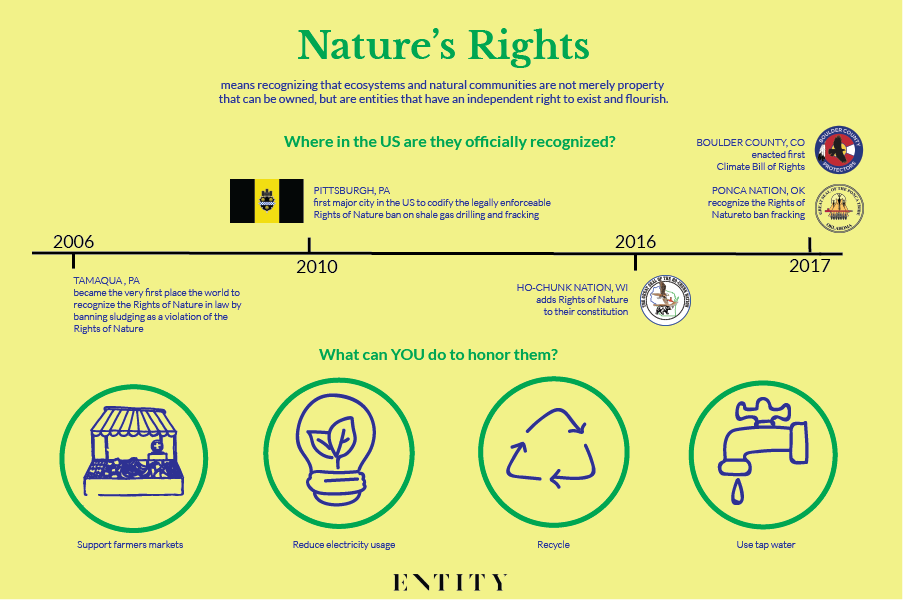Sustainability July 5, 2018
What are the rights of nature? Where are they protected? And what are simple steps you can take to help the environment?


“You think you own whatever land you land on. The earth is just a dead thing you can claim. But I know every rock and tree and creature has a life, has a spirit, has a name.”
Pocahontas knew long before us.
It was not until 1972 when Law Professor Christopher Stone was the first to argue (aside from Pocahontas) for rights of nature. (Admittedly, Colors of the Wind came out in the late 90s, but let’s assume real-life Pocahontas, who was the model for the Disney version, sang something similar in the 16th century).
Still, to this day, almost every country considers nature property that gives the owner the right to destroy it and its ecosystems. “The rights of nature” rejects that notion and states that ecosystems and natural communities are entities that have an “independent right to exist and flourish.”
It took until 2006 for the first town in the U.S. — Tamaqua, Pennsylvania– to officially recognize nature’s rights in its laws by banning sludging as a violation of those rights.
Pennsylvania continued to be on the forefront of the nature’s rights movement.
Pittsburgh, Pennsylvania was the first major city in the U.S. to adopt nature’s rights in one of its ordinances as part of a ban on shale gas drilling and fracking. Way to go, Pennsylvania!
Years after, other communities in the U.S. have moved to adopt the rights of nature in their laws, including Colorado and Native American Nations like the Ho-Chunk in Wisconsin and the Ponca in Oklahoma.
Although many states still do not recognize the rights of nature by law, there are small steps that you can incorporate in your daily routine to help honor nature and its ecosystems as living beings.
Here are four tips to be more sustainable:
Eating and buying produce locally helps the environment because they are more sustainably farmed. The comfort of going to the supermarket and finding imported produce comes with a cost. The transportation of this produce to supermarkets consumes huge amounts of fossil fuel.
There are many ways to cut down your electric bill. And most of them only involve one or two small steps. Here are some of them:
Run your appliances, like dishwasher and laundry machine, in the evening. Because these appliances produce heat, they can cause air conditioning to work harder.
Speaking of dishwasher and laundry machine; you could stop using the dishwasher and dryer altogether and wash your dishes by hand and hang your clothes to dry.
If you want to go the extra step, install a programmable thermostat that lowers or raises the temperature when you’re not home. On the same route, install energy-efficient appliances and compact fluorescent bulbs.
Last but not least, the easiest but very effective measure: Turn off appliances and lights when you are not using them.
Anything from cans, glass to plastic and paper can be recycled. There are different ways to recycle certain materials. But it’s not as complicated as it may seem.
The rule of thumb is if you see the symbol of three arrows in a circle (see infographic), it means your container is recyclable.
When it comes to cans, you can recycle almost all of them aside from aerosol spray cans and paint cans.
Most glass is recyclable, too. When the glass is either clear, brown or green, it’s good for recycling. Those do not include mirrors, dishes, light bulbs, crystals or ceramics.
You can also recycle plastic bottles and jars, like your milk jug, shampoo bottles and soda bottles.
Bottled water unnecessarily adds to our plastic consumption. However, most bottled water is just bottled from city water supplies anyway. So you can go directly to the source and drink from the tap. It’s safe, often tastes the same and is much cheaper!